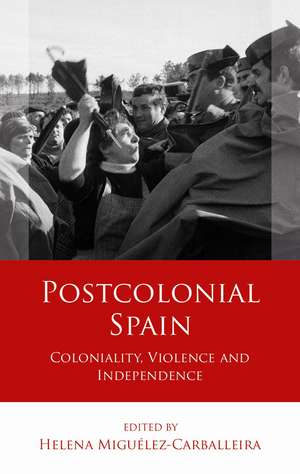Postcolonial Spain: Coloniality, Violence and Independence: Iberian and Latin American Studies
Editat de Helena Miguélez-Carballeiraen Limba Engleză Hardback – 19 iun 2024
At times explosive, at times restrained, the question of independence has been a fundamental force shaping contemporary Spain. However, the discipline of Spanish (Peninsular) studies has been slow to consider the reality of internal anticolonial and self-determination movements in Spain as part of their scope. Postcolonial Spain: Coloniality, Violence and Independence is the first book in Spanish (Peninsular) studies to engage with the question of independence as a major structuring factor in post-1898 Spanish culture and politics. It engages postcolonial theory to shed light on the question of Spain’s ongoing internal national conflict, arguing that modern manifestations of such conflict are linked to internal demands for national sovereignty, independence, and self-determination. It addresses topics such as late nineteenth-century penitentiary discourses, the biopolitics of Francoist agrarian reform, dispossession and mass tourism in Mallorca, the judiciary aftermath of the Catalan referendum on independence of 2017, and post-ETA memory politics.
Din seria Iberian and Latin American Studies
- 8%
 Preț: 459.38 lei
Preț: 459.38 lei - 11%
 Preț: 546.62 lei
Preț: 546.62 lei - 11%
 Preț: 508.34 lei
Preț: 508.34 lei - 8%
 Preț: 564.74 lei
Preț: 564.74 lei - 8%
 Preț: 494.04 lei
Preț: 494.04 lei - 8%
 Preț: 528.39 lei
Preț: 528.39 lei - 8%
 Preț: 529.24 lei
Preț: 529.24 lei - 15%
 Preț: 549.27 lei
Preț: 549.27 lei - 15%
 Preț: 548.53 lei
Preț: 548.53 lei - 8%
 Preț: 529.81 lei
Preț: 529.81 lei - 8%
 Preț: 377.45 lei
Preț: 377.45 lei - 15%
 Preț: 482.94 lei
Preț: 482.94 lei - 13%
 Preț: 340.85 lei
Preț: 340.85 lei - 8%
 Preț: 339.28 lei
Preț: 339.28 lei -
 Preț: 143.82 lei
Preț: 143.82 lei -
 Preț: 340.37 lei
Preț: 340.37 lei -
 Preț: 341.94 lei
Preț: 341.94 lei - 15%
 Preț: 452.10 lei
Preț: 452.10 lei - 10%
 Preț: 415.60 lei
Preț: 415.60 lei - 8%
 Preț: 459.91 lei
Preț: 459.91 lei - 15%
 Preț: 549.03 lei
Preț: 549.03 lei
Preț: 529.24 lei
Preț vechi: 575.26 lei
-8% Nou
Puncte Express: 794
Preț estimativ în valută:
101.29€ • 109.34$ • 84.93£
101.29€ • 109.34$ • 84.93£
Carte disponibilă
Livrare economică 29 martie-12 aprilie
Livrare express 15-21 martie pentru 30.88 lei
Preluare comenzi: 021 569.72.76
Specificații
ISBN-13: 9781837721054
ISBN-10: 183772105X
Pagini: 256
Ilustrații: 1 halftone
Dimensiuni: 138 x 216 x 23 mm
Greutate: 0.45 kg
Editura: University of Wales Press
Colecția University of Wales Press
Seria Iberian and Latin American Studies
ISBN-10: 183772105X
Pagini: 256
Ilustrații: 1 halftone
Dimensiuni: 138 x 216 x 23 mm
Greutate: 0.45 kg
Editura: University of Wales Press
Colecția University of Wales Press
Seria Iberian and Latin American Studies
Notă biografică
Helena Miguélez-Carballeira is professor of Hispanic Studies at Bangor University and director of the Centre for Galician Studies in Wales.
Cuprins
Illustrations
Acknowledgements
Notes on Contributors
Introduction – Helena Miguélez-Carballeira
Otherness and corporal precarity: on the representation of torture in democratic Spain – Juan Albarrán
The Spanish state of Catalan exception: building the necessity for exceptional rule on Catalan independence – Sergi Auladell Fauchs
The persistence of neocolonial logic in Fernando León de Aranoa’s Amador (2010) – Bryan Cameron
Contemporary Majorcan culture and the transnational tourist gaze: colonial dynamics, cultural identity and spatial dispossession – Guillem Colom-Montero
Conflict as a place of consensus: the representation of political violence in Twist (2013) by Harkaitz Cano and Martutene (2012) by Ramon Saizarbitoria – Ibon Egaña Etxebarria
Pakean Utzi Arte: art and resistance in Basque subaltern memories – Amaia Elizalde Estenaga and Ismael Manterola Ispizua
Truncated modernities: Chillida, Tindaya, Fuerteventura – Isaac Marrero-Guillamón
The Spanish rural subject and the Instituto Nacional de Colonización (1939–71): coloniality, biopolitics and memory – Helena Miguélez-Carballeira
Hegemonic memory politics and the Basque Nationalist Party: antifascism and the question of violence – Beñat Sarasola Santamaria
The failed panopticon? Architecture, social projects and the problematic notion of ‘model’ in Barcelona’s Presó Model – Aurélie Vialette
